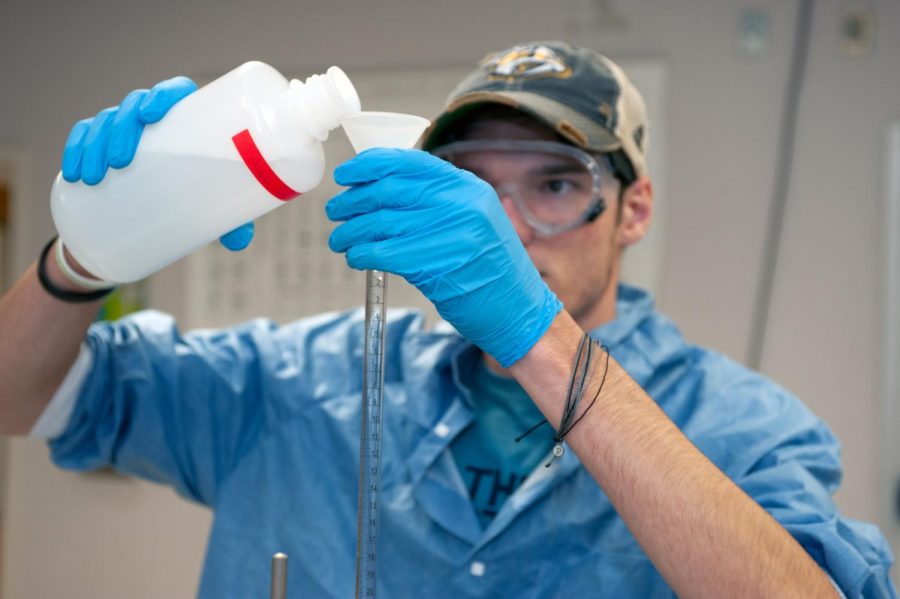Easing STEM Students’ Education Harms Future Doctors and Patients
In the past four years the world of secondary education has undergone dramatic changes. Standardized testing to get into colleges has nearly gone out the window, lecture halls are no longer necessary to conduct class and many are questioning whether or not they even need to attend college to have a financially successful future.
Another change some students are calling for is making undergraduate STEM classes more accessible. Many first year classes in biology, chemistry, physics and engineering are notorious for their difficulty. These difficult classes are attempts to weed out less academically apt students through subjects like organic chemistry, a common prerequisite for medical school. Recently, an NYU professor was fired on account of consistent low test scores in his classes. I believe this push to make STEM classes more accessible is a radical step in the wrong direction.
It’s no secret, even at a school like Fordham which has a greater focus on the humanities and business, that STEM majors tend to have a tougher time than the rest of us in academics. As a political science major, I probably have less homework than a first-year integrative neuroscience major on the pre-health professional track. Yet, in four years time, the two of us will be walking down the same Keating steps as members of the 2026 undergraduate class of Fordham College at Rose Hill.
Frankly, this academic leveling is not entirely fair. However, when considering graduate schools, those “weed-out” classes become vital in the application process. The median MCAT point difference between the lowest rated medical school and Johns Hopkins Medical School is only 20 points, with a perfect score of 528. Compare that 3% difference to the median test scores for undergraduates accepted into Johns Hopkins University and the University of Alabama, with Hopkins having a median composite of SAT of 1520, while Alabama has a median of 1200, a 20% difference.
If everybody had high grades in traditional weed-out classes, medical schools would have a harder time differentiating candidates, and thus applicants would have to work harder in other areas to differentiate their resume. Considering how hard it already is to be accepted into medical school, first years may end up sleeping in their labs, interning year-round at a hospital and experiencing pressure to have even higher MCAT scores just to stand out. By making the weed-out classes easier, the rest of the pre-med work will become more difficult.
And then what happens when they get to medical school? The amount of studying required to survive medical school, let alone be at the top, is incomparable to most challenges under-22 year olds in America are faced with.
Having grown up with a doctor for a mother, I have been told every day that I do not have the fortitude to handle medical school. I was regaled with stories of 48 hour study sessions, five exams in a day and thousands of memorized textbook pages. If one cannot handle the one or two weed-out classes they take as part of their undergraduate education, how can they expect to handle the full course load of human biology and chemistry?
And once in medical school, their post-graduation paths also have to be considered. Will they subspecialize? Become a surgeon? All of these options require further work to be at the top of their field. When one finally is able to practice medicine, the work doesn’t get any easier. Long hours, being on call 24/7 depending on your specialty and rarely seeing your family are all challenges that come with the job. Nowhere on the path to becoming a practicing physician is it easy, nor should it be, and it is a disservice to the prospective doctors of the world to pretend that it is.
There’s another issue that comes with getting rid of weed-out classes. Patient confidence is an important part of providing high quality health care. How much would you trust a bridge if the engineer that designed it failed introductory physics? If you can’t be certain that your doctor satisfactorily understands the biology and chemistry of your body, how much would you trust their diagnosis?
It is understandable to want to ameliorate the suffering of those in STEM majors. I salute them for pursuing such a difficult undertaking. But when it comes to making decisions that directly affect the health of people, I would want to leave those decisions to the experts: the ones who went through rigorous schooling at every level.
Owen Sibal, FCRH ’26, is a political science major from Richmond, V.A.










































































































































































































